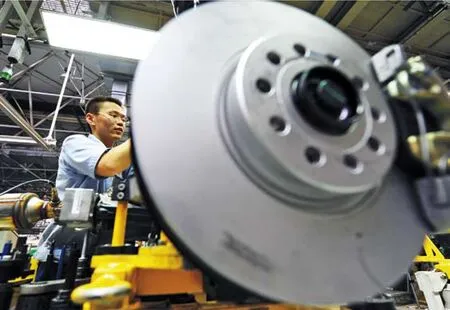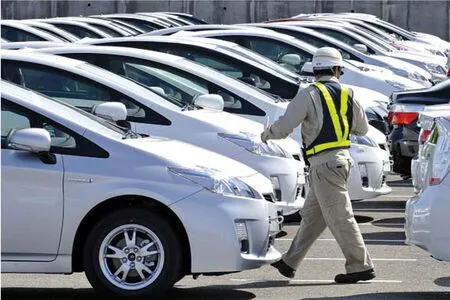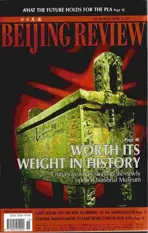If It’s Broken, Fix It
2011-10-14ByLANXINZHEN
By LAN XINZHEN
If It’s Broken, Fix It
By LAN XINZHEN
China has been slow to adopt auto recall procedures similar to those in the West,but new regulations are in the works
On January 26 this year, Toyota announced a worldwide recall of 1.7 million vehicles from countries including Japan, the United States, the United Kingdom and Germany, because of vehicle defects that caused fuel leaks. But the world’s largest auto market—China’s mainland—was not included in the recall.
The General Administration of Quality Supervision, Inspection and Quarantine (AQSIQ), China’s consumer product quality watchdog, inquired into the country’s absence of the recall, asking Toyota Motor (China) Investment Co. Ltd. to provide an explanation. The meeting did not prompt Toyota to include China in the recall.
A recent report of the U.S. National Highway Traffic Safety Administration said there were 648 auto recalls in 2010 in the United States and more than 20 million cars were recalled.
In contrast, last year China only had 123 recalls that took 1.17 million cars off the road. Meanwhile, of the 123 recalls,imported cars accounted for a larger proportion than domestic cars produced by Chinese-foreign joint ventures. China imported 700,000 cars in 2010, only 4 percent of the total car sales. Of the recalls, 85 were for imported cars, 70 percent of the total.
General Motors sold more cars in China last year than in the United States for the fi rst time in the automaker’s history of more than 100 years. Last year,General Motors recalled 4 million cars from auto dealers across the United States. But in China, it recalled 36,509 cars, all of which were imported cars.No cars produced through GM’s joint ventures with Chinese companies were recalled.
Since 2004 there have been more than 300 car recalls in China, and almost all luxury brands like Rolls-Royce, Land Rover, Benz, BMW and Lexus, have recall records.
In China, Jetta and Santana cars are the two most popular brands on the road produced by Volkwagen’s joint ventures in China, both surpassing 2 million units.However, neither has had to issue a recall.
This was not because cars sold in China are any safer than cars sold in other markets.

XU JIAJUN
Why are automakers afraid of recalling cars in China? A lack of a sound recall system could be one reason, said Jia Xinguang, chief analyst with China Automobile Industry Consulting Co. Ltd.
System defects
The prevailing regulations on car recalls in China are the Provisions on the Administration of Recalling Defective Auto Products issued in 2004. But different from compulsory certi fi cation and compulsory recalling in countries like the United States, China follows a model of compulsory certification and voluntary recalling.
“Without legal compulsory regulation, automakers are obviously not going to voluntarily issue recalls,” Jia said.
Automakers that try to conceal product defects or delay recalls can be hit with fi nes between 10,000 yuan ($1,527) and 30,000 yuan ($4,580), amounts that don’t add up to much against companies with operating revenues and pro fi ts in the billions of yuan in some cases.
High recall costs, which automakers usually have to bear for spare parts and labor, and potential harm to brand image are also deterrents to issuing mass auto recalls. The latter reason holds particular sway in China where consumers assume that only poor quality and unsafe cars,and therefore all cars from a specific brand, are recalled. Consumers in China are also more likely to abandon a brand forever if their newly bought cars are recalled.
Automakers have taken steps to alleviate consumer concerns by providing explanations that the car’s overall quality is not faulty, but there are certain safety issues in certain models that need to be addressed right away. Fixing the car now means less problems later and is therefore bene fi cial to the consumer.
“In recent years consumers have become more comfortable with the idea of a car recall. Some consumers even make inquiries themselves if they think something is wrong with their car,” Jia said.“But even if consumers fi nd problems in their cars that would necessitate a recall,automakers will choose to ignore and evade them.”
The problem is this: It is hard for the AQSIQ to fi nd safety defects in various car models and launch recalling orders to the automakers, allowing automakers to slip without suffering repercussions.Some companies do take an altruistic approach and issue voluntary recalls to protect their consumers and brand reputation—but most don’t.
New regulations
China’s absence from Toyota’s recent global recall has put auto recalls under the microscope.
Liu Pingjun, Vice Minister of the AQSIQ, said the government is actively improving related laws and regulations and trying to promulgate the Regulations on Supervision and Administration of Recall of Auto Products this year.
A draft of these regulations, based on the Provisions on the Administration of Recall of Defective Auto Products in 2004, was published for public opinion in July 2010. According to the draft, both imported and domestically produced cars are incorporated into the regulations.
Compared with the previous provisions, the new regulations strengthened punishment against automakers that neglect to issue recalls. Fines will be raised to 2-50 percent of the value of recalled cars, instead of the maximum fine of 30,000 yuan ($4,580).
Jia said in the past there were many deficiencies in the provisions related to car recall and the punishment was too low. The new regulations are making progress by increasing punishments.
Zhong Shi, an independent analyst of automobile industry, said the old recall provisions were not severe and the supervision was far behind that in foreign countries. But the new regulations draw on international practices and should have been issued long ago.
However, this does not mean automakers that fail to implement recalls will be held legal responsibilities. Unless significant accidents occur or consumer complaints increase, the government will only strengthen punishments against automakers, not directly reprimand them,said Zhong.

(Left)QUALITY IS KEY: A worker assembles car parts on the production line of a FAW-VW Automobile Co.Ltd. factory, a joint venture between China’s FAW Group and Volkswagen GOING TO THE DEALERS:Toyota Prius hybrid electric vehicles are waiting to be sold in Aichi Prefecture,Japan, in March 2010
Car Recalls in China and the United States In 2010
China sold 18.06 million cars, issued 123 recalls and recalled 1.17 million vehicles. The number of recalled cars accounted for 6.5 percent of the total sales volume.
The United States sold 11.59 million cars, issued 648 car recalls and recalled 20.28 million vehicles. The number of recalled cars accounted for 175 percent of the total sales volume.
